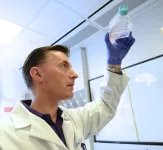(Press-News.org) A team of scientists at the Medical University of South Carolina (MUSC) has identified a stress-regulated gene that plays a role in the link between long-term stress and a common type of depressive behavior in mice. Specifically, this gene was needed for long-term stress to produce a loss of interest in activities that were once rewarding or pleasurable – often called anhedonia. However, the gene did not play a role in other common depressive-like symptoms, such as social avoidance and increased anxiety-like behavior. The team reported its findings recently in eLife.
The study was led by neuroscientists Makoto Taniguchi, Ph.D., and Christopher Cowan, Ph.D., and also Brandon Hughes, Ph.D., who was at the time of the study a graduate student in Neuroscience at MUSC and is now a postdoctoral fellow at the Icahn School of Medicine at Mount Sinai.
The finding that the genetic pathway affected only one type of depressive behavior could have implications for how we treat depression, said Taniguchi.
“If we can find the individual mechanisms for the different symptoms, we can target these symptoms specifically in future therapeutic strategies,” he said.
Not everyone with long-term stress develops depression, explained Cowan, chair of the MUSC Department of Neuroscience, scientific council member of the Brain & Behavior Research Foundation and close collaborator of Taniguchi.
“Many individuals can rebound from chronic stress,” he said.
However, some people who experience repeated stress develop depressive symptoms. Understanding how stress and depression are connected in the brain can help us to develop better treatments for people with mental health disorders.
How stress affects the brain
Taniguchi leads a lab in the Department of Neuroscience that is examining the relationship between stress and depression in the brain. In mice, long-term stress decreases functioning in the front part of the brain, he said. People with major depressive disorder often have reduced brain activity in the same part of the brain. Scientists have long thought that this loss of brain activity in the frontal part of the brain contributes to the symptoms of depression.
Taniguchi and Cowan wondered whether there could be an important intermediary linking long-term stress to the development of depressive behavior.
They knew the gene NPAS4 was involved in the functioning of a portion of the brain called the prefrontal cortex. They also knew it acted as a “master regulator,” meaning that it could change the way many genes are expressed based on brain activity.
Exposing mice to stress triggers NPAS4 in the prefrontal cortex. In turn, NPAS4 changes gene expression and reduces functioning of this important reward-linked brain region. This change in gene expression is also seen in the brains of people with mental health disorders, such as depression.
The research team speculated that NPAS4 might play a crucial role in linking long-term stress with depression-like behaviors.
To test this hypothesis, the team manipulated NPAS4 in stressed mice and watched how they behaved. Surprisingly, NPAS4 did not affect all depressive behaviors –only the loss of interest in pleasurable activities. NPAS4 was not involved in either social avoidance or anxiety-like behaviors.
One size does not fit all
The team’s findings suggest that there is not one central mechanism by which stress causes the varied symptoms of depression. Instead, multiple pathways could connect stress with different types of symptoms.
Diagnostic manuals list a variety of different depressive symptoms, including loss of energy, problems with sleep and difficulty concentrating. However, most patients with major depressive disorder develop only some of the common symptoms. Put another way, depression is not “one size fits all.”
The study’s findings, which identify a new brain mechanism associated with a single depressive-like symptom, support the idea of treating mental health disorders at the symptom- rather than diagnosis-level. They also suggest that effective treatments might need to target distinct brain mechanisms.
“I'm excited about the idea that we can start to focus in on individual symptoms,” said Cowan.
Cowan explained that some depressive symptoms can also be experienced by people with other mental health disorders, such as anxiety disorders, substance use disorder and schizophrenia.
Targeting specific symptoms could be a way to offer more effective, personalized treatments. For example, transcranial magnetic stimulation (TMS) is a noninvasive treatment for people with depression that is typically used when other treatments have not been effective. During TMS, an electronic magnetic coil is placed near an individual’s forehead, and the magnetic fields stimulate nerve cells in the brain. This study’s findings can help to inform how to target more effectively the parts of the brain that are most relevant to the symptoms someone is experiencing.
“Depression is a mixed thing – different symptoms emerge in different individuals,” said Cowan. “Understanding the brain mechanisms underlying the varied symptoms, and recognizing that they are potentially distinct, is likely to pave the way for precision medicine approaches to treat specific symptoms in individuals struggling with mental health disorders.”
# # #
Pilot funding from the South Carolina Clinical & Translational Research Institute helped to support early stages of this work, as well as a National Alliance for Research on Schizophrenia and Depression (NARSAD) Young Investigator Grant from the Brain & Behavior Research Foundation.
About MUSC
Founded in 1824 in Charleston, MUSC is the state’s only comprehensive academic health system, with a unique mission to preserve and optimize human life in South Carolina through education, research and patient care. Each year, MUSC educates more than 3,000 students in six colleges – Dental Medicine, Graduate Studies, Health Professions, Medicine, Nursing and Pharmacy – and trains more than 850 residents and fellows in its health system. MUSC brought in more than $297.8 million in research funds in fiscal year 2022, leading the state overall in research funding. For information on academic programs, visit musc.edu.
As the health care system of the Medical University of South Carolina, MUSC Health is dedicated to delivering the highest quality and safest patient care while educating and training generations of outstanding health care providers and leaders to serve the people of South Carolina and beyond. Patient care is provided at 14 hospitals with approximately 2,500 beds and five additional hospital locations in development, more than 350 telehealth sites and connectivity to patients’ homes, and nearly 750 care locations situated in all regions of South Carolina. In 2022, for the eighth consecutive year, U.S. News & World Report named MUSC Health the No. 1 hospital in South Carolina. To learn more about clinical patient services, visit muschealth.org.
MUSC and its affiliates have collective annual budgets of $5.1 billion. The nearly 25,000 MUSC team members include world-class faculty, physicians, specialty providers, scientists, students, affiliates and care team members who deliver groundbreaking education, research and patient care.
About the SCTR Institute
The South Carolina Clinical & Translational Research (SCTR) Institute is the catalyst for changing the culture of biomedical research, facilitating the sharing of resources and expertise and streamlining research-related processes to bring about large-scale change in clinical and translational research efforts in South Carolina. Our vision is to improve health outcomes and quality of life for the population through discoveries translated into evidence-based practice. To learn more, visit https://research.musc.edu/resources/sctr.
END
New genetic finding provides clue for personalizing depression treatment
Medical University of South Carolina researchers have found a key gene that links long-term stress to a common depressive symptom, pointing to the need for more personalized depression treatments
2023-04-07
ELSE PRESS RELEASES FROM THIS DATE:
Lonely people’s divergent thought processes may contribute to feeling “alone in a crowded room”
2023-04-07
Common wisdom suggests that a core difference between solitude and loneliness is choice. Whereas a person who appreciates solitude might choose to enjoy a quiet night in or a solo trip abroad, a lonely person may feel disconnected from other people even in a crowded room. New research published in Psychological Science supports this notion, suggesting that lonely people may think differently regardless of the size of their social networks.
“We found that lonely individuals are exceptionally dissimilar to their peers in the way that they process the world around them … ...
New research: Policies that aim to increase the supply of teachers may also lower teacher pay, thereby perpetuating the cycle of teacher shortages
2023-04-07
Context and Background
Teaching has historically been a licensed profession in which a limited number of schools of education were typically housed in universities and offered a traditional path to certification (Kleiner, 2000). However, 30 years of documented teacher shortages in the United States resulted in federal and state policies that reduce barriers to teacher licensure (Cross, 2017). The goal of these policies is to create a larger pool of new teachers in less time than it typically takes schools of education to produce ...
UC Riverside-led study sheds light on how IBD can develop
2023-04-07
RIVERSIDE, Calif. -- Inflammatory bowel disease, or IBD, describes Crohn’s disease and ulcerative colitis, two chronic diseases that cause inflammation in the intestines. IBD, which affects about 3 million adults in the United States, is an autoimmune disorder — a condition in which the body’s immune system attacks healthy tissues. Its symptoms include diarrhea, rectal bleeding, fatigue, weight loss, and stomach cramps.
The intestinal epithelium, made up of a layer of cells that lines the intestine, plays an important role in IBD because it can be easily disrupted during gut inflammation. A specialized ...
Novel approach prevents liver damage in animal models of Alagille syndrome
2023-04-07
Alagille syndrome, a genetic disease estimated to affect 1 in 30,000 individuals, is caused by mutations in the gene JAG1 in most cases. The mutations affect multiple organs including the liver where it often results in cholestasis, a condition in which the flow of bile from the liver stops or slows, leading to bile buildup that in time causes liver damage. Current treatments focus on delaying disease progression; the only cure for liver disease in Alagille syndrome is liver transplantation.
Researchers at Baylor College of Medicine and collaborating institutions have discovered a strategy that prevents liver damage in animal ...
Study reveals epigenetic vulnerability of acute myeloid leukemia
2023-04-07
Acute myeloid leukemia (AML) is an aggressive blood cancer that causes uncontrolled accumulation of white blood cells. Because of the poor outcomes of this disease, researchers across the globe have been on the hunt for new ways to treat AML, while preserving normal blood development.
Researchers at Baylor College of Medicine and collaborating institutions report in the journal Cancer Research a new vulnerability of this cancer that can be targeted with a class of experimental drugs. These drugs target a protein complex called SWI/SNF, which many cells use to make DNA more open and accessible. ...
nTIDE March 2023 jobs report: people with disabilities maintain record labor force participation rate, outperforming people without disabilities
2023-04-07
East Hanover, NJ – April, 7 2023 – People with disabilities maintained their record labor force participation rate in March, continuing to outperform people without disabilities, according to today’s National Trends in Disability Employment – semi-monthly update (nTIDE), issued by Kessler Foundation and the University of New Hampshire’s Institute on Disability (UNH-IOD). Year-to-year, people with and without disabilities showed gains in employment, reflecting the economy’s ongoing recovery from the effects of the COVID-19 ...
Researchers find an antibody that targets omicron and other SARS-CoV-2 variants
2023-04-07
A team led by researchers at Weill Cornell Medicine, the University of Wisconsin-Madison; Scripps Research and the University of Chicago has identified an antibody that appears to block infection by all dominant variants of the virus that causes COVID-19, including Omicron, the most recent. Their discovery could lead to more potent vaccines and new antibody-based treatments.
In a study published March 6 in the Journal of Clinical Investigation, senior author Dr. Patrick Wilson, the Anne E. Dyson Professor of Pediatric Research and a member of the Gale and Ira ...
Sustained-release chemotherapy gives new option for frail patients with invasive bladder cancer
2023-04-07
April 7, 2023 – For patients with advanced bladder cancer who are medically unfit for standard treatment, a new intravesical (inside the bladder) chemotherapy delivery system called TAR-200 is safe and shows initial evidence of effectiveness, reports a study in the May issue of The Journal of Urology®, an Official Journal of the American Urological Association (AUA). The journal is published in the Lippincott portfolio by Wolters Kluwer.
TAR-200 is a drug-device combination product that is inserted into the bladder and provides continuous, low-dose, local delivery of chemotherapy. "Our preliminary clinical trial found that TAR-200 was generally safe, well tolerated, and had ...
NASA’s high-resolution air quality control instrument launches
2023-04-07
A NASA instrument to provide unprecedented resolution of monitoring major air pollutants – down to four square miles – lifted off on its way to geostationary orbit at 12:30 a.m. EDT Friday. The Tropospheric Emissions: Monitoring of Pollution (TEMPO) instrument will improve life on Earth by revolutionizing the way scientists observe air quality from space.
"The TEMPO mission is about more than just studying pollution – it's about improving life on Earth for all. By monitoring the effects of everything from rush-hour traffic to pollution from forest fires and volcanoes, NASA data will help improve air quality across North America and protect ...
AACR announces Fellows of the AACR Academy Class of 2023 and new AACR Academy President
2023-04-07
PHILADELPHIA – The American Association for Cancer Research (AACR) today announced its newly elected class of Fellows of the AACR Academy.
The mission of the AACR Academy is to recognize and honor distinguished scientists whose scientific contributions have propelled significant innovation and progress against cancer. Fellows of the AACR Academy serve as a global brain trust of top contributors to cancer science and medicine who help advance the mission of the AACR to prevent and cure all cancers through research, education, communication, collaboration, science policy and advocacy, and funding for cancer research.
All Fellows are nominated and elected ...
LAST 30 PRESS RELEASES:
How much sleep do teens get? Six-seven hours.
Patients regain weight rapidly after stopping weight loss drugs – but still keep off a quarter of weight lost
GLP-1 diabetes drugs linked to reduced risk of addiction and substance-related death
Councils face industry legal threats for campaigns warning against wood burning stoves
GLP-1 medications get at the heart of addiction: study
Global trauma study highlights shared learning as interest in whole blood resurges
Almost a third of Gen Z men agree a wife should obey her husband
Trapping light on thermal photodetectors shatters speed records
New review highlights the future of tubular solid oxide fuel cells for clean energy systems
Pig farm ammonia pollution may indirectly accelerate climate warming, new study finds
Modified biochar helps compost retain nitrogen and build richer soil organic matter
First gene regulation clinical trials for epilepsy show promising results
Life-changing drug identified for children with rare epilepsy
Husker researchers collaborate to explore fear of spiders
Mayo Clinic researchers discover hidden brain map that may improve epilepsy care
NYCST announces Round 2 Awards for space technology projects
How the Dobbs decision and abortion restrictions changed where medical students apply to residency programs
Microwave frying can help lower oil content for healthier French fries
In MS, wearable sensors may help identify people at risk of worsening disability
Study: Football associated with nearly one in five brain injuries in youth sports
Machine-learning immune-system analysis study may hold clues to personalized medicine
A promising potential therapeutic strategy for Rett syndrome
How time changes impact public sentiment in the U.S.
Analysis of charred food in pot reveals that prehistoric Europeans had surprisingly complex cuisines
As a whole, LGB+ workers in the NHS do not experience pay gaps compared to their heterosexual colleagues
How cocaine rewires the brain to drive relapse
Mosquito monitoring through sound - implications for AI species recognition
UCLA researchers engineer CAR-T cells to target hard-to-treat solid tumors
New study reveals asynchronous land–ocean responses to ancient ocean anoxia
Ctenophore research points to earlier origins of brain-like structures
[Press-News.org] New genetic finding provides clue for personalizing depression treatmentMedical University of South Carolina researchers have found a key gene that links long-term stress to a common depressive symptom, pointing to the need for more personalized depression treatments



